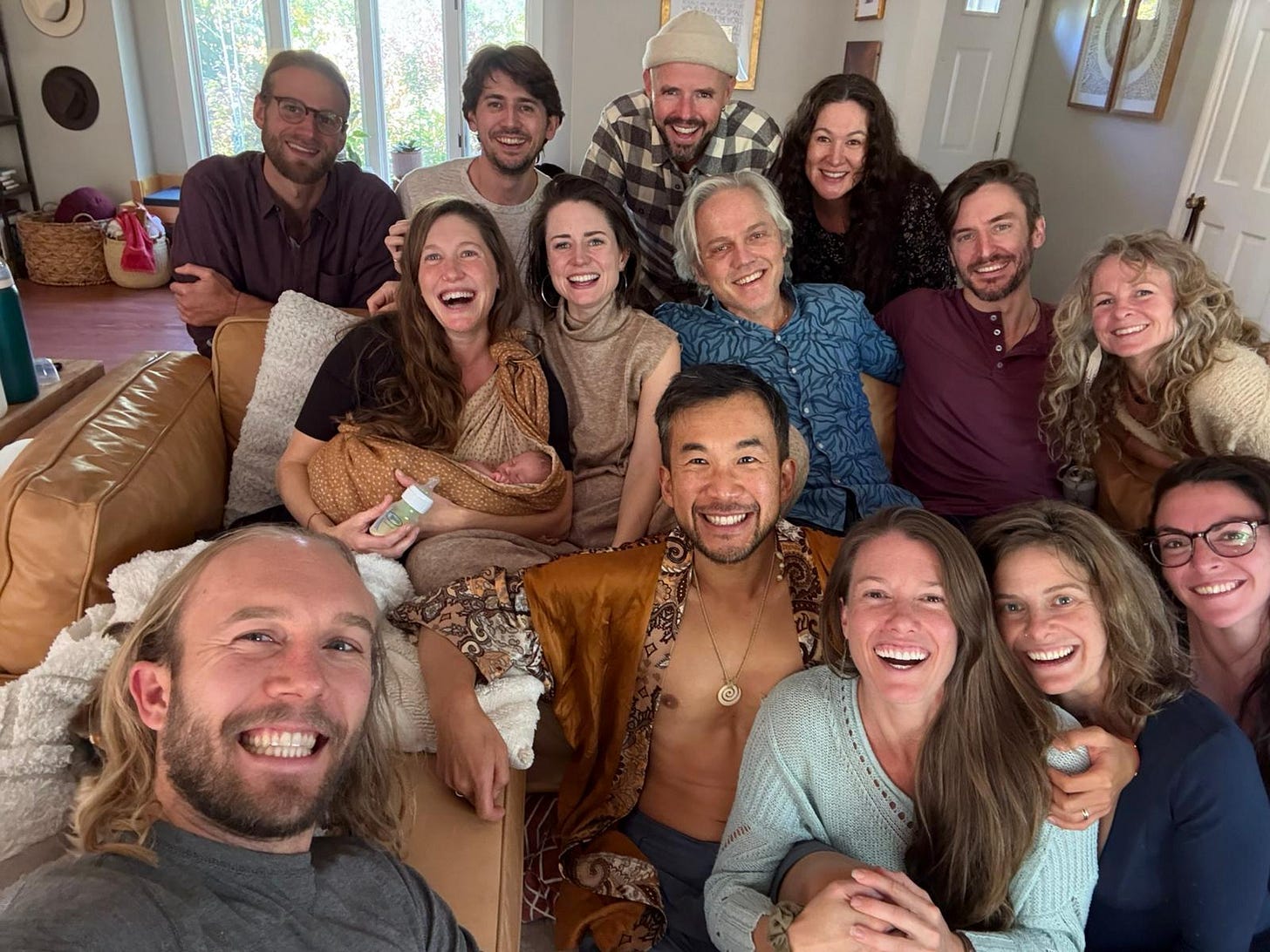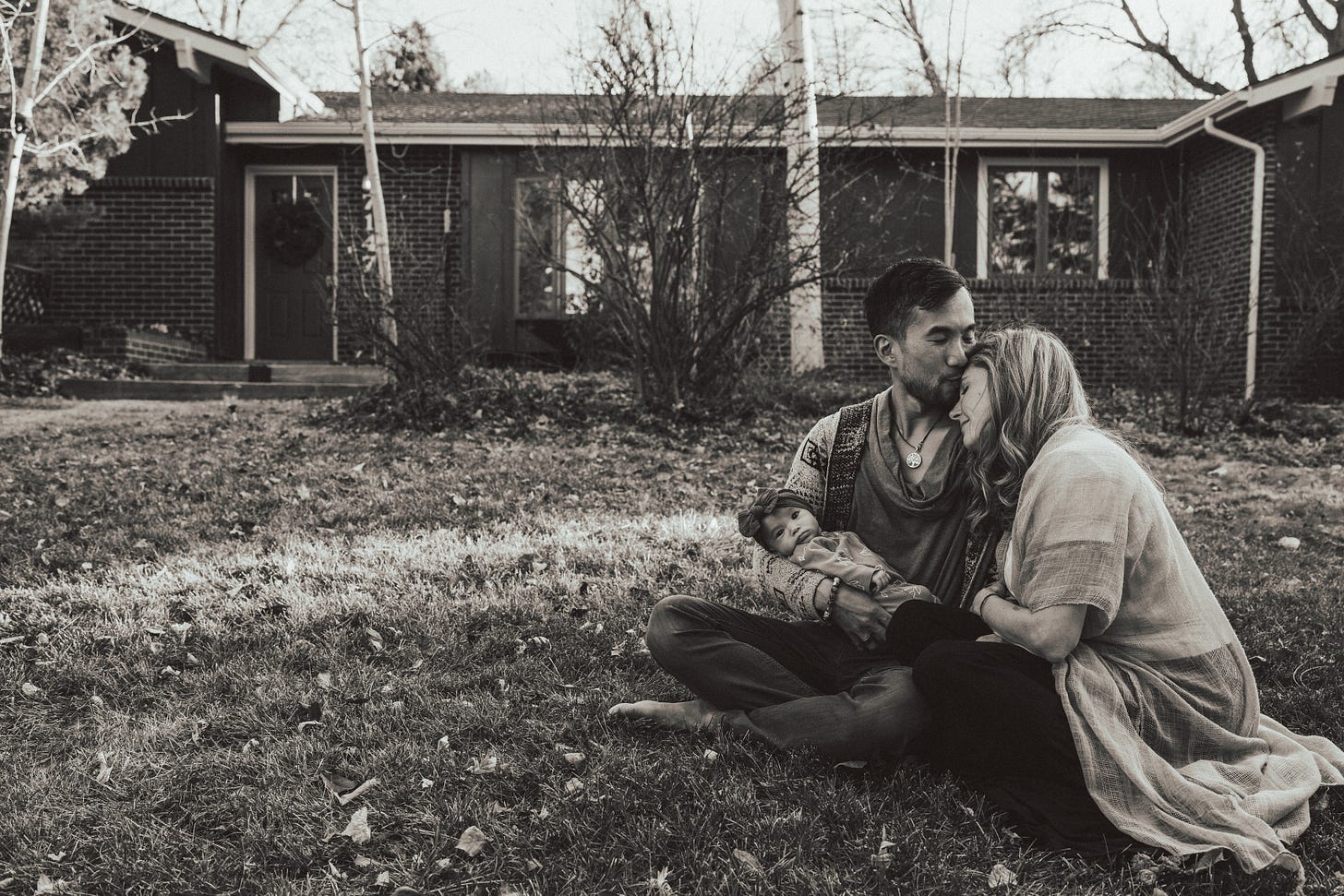100 Days of Parenting: The Raw, Beautiful Truth
Three life-changing themes in the journey of becoming a new mom
As I reflect on my first 100 days of parenthood, I’m struck by how much this initiation from “maiden to mother” has challenged and expanded me.
I gave birth in mid-October, and since then, I’ve been in a sacred bubble of rehabilitating my physical body and nourishing my emotional body.
The narratives I was told about early parenthood included stories about sleep deprivation, overwhelm, isolation, and even the idea of losing yourself—especially as a woman.
There’s some truth to these stories—this season is challenging in so many ways. But what I’ve learned is that it doesn’t have to be isolating, and I don’t have to lose myself in it.
Along this journey, I’ve noticed three themes:
Rebuilding the village
Caring for the nervous system
Attunement—both to my baby and to myself
These themes aren’t just shaping how I approach motherhood; they’ve reshaped how I approach my entire life.
1. Rebuilding the Village
We live in a time where the idea of the village—the community that once supported each other through every stage of life—has faded away.
Parenthood, for many, feels isolating because elders, shared wisdom, and communal care have largely disappeared.
What I’ve learned is that if we want a village, we have to build it ourselves—and that starts with vulnerability and clear invitations.
Unless we do those two things, the people we love may not know how to show up.
One of the most powerful examples of this for me has been with several of our male friends.
When they asked how they could support us in the postpartum period, we made it easy for them to show up in meaningful ways.
We had a community sign-up sheet with specific slots for people to come by. When they arrived, they stepped into our world—doing meal prep, cleaning dishes, holding space.
At first, when we created the sign-up sheet, sending it out to friends shot terror through my body. They all live full and busy lives. What if it was too much to ask? What if nobody signed up?
Then, one of the men signed up for six slots! They burst my imagined limits on people’s willingness to offer support. We had community members in our home every single day through the first critical chapter of parenthood.
They saw the truth of what those first few weeks of parenthood really looked like—the exhaustion, the beauty, the mess.
I learned that I can lean on the men in my life, not just the women. And as a new mother in a world where I’ve often seen men displaced from the process of birth and postpartum—this was profound.
The experience reminded me that love can be expressed as service, and that asking for help doesn’t just benefit us—it gives others the opportunity to build mutual trust in tangible ways.
We didn’t just feel supported; we felt connected.
And to me, that’s what rebuilding the village is all about.
2. Caring For The Nervous System
The early days of parenthood stretched me in ways I didn’t expect.
It’s not just about making it through sleepless nights or meeting the constant demands of a newborn—it’s about learning how to take care of my nervous system through it all.
For me, the key wasn’t avoiding the hard moments, but finding ways to meet them, even when I felt depleted. That requires nervous system regulation, and asking the question “What do I need right now?” in moments of overwhelm.
One day recently, my husband and I had a relational rupture that felt especially difficult.
In the past, it might have taken several sessions with our relationship coach to fully repair. Instead of waiting on external help, I took an entire day to focus on my nervous system so I could feel clear again.
What do I need? What can I not see? What can I own? became my mantra.
I’d walked into the nursery to see the baby wipes all out of place again after having spent my only free moments in the day cleaning up (rather than stretching my body). And a fuse set off in me.
WTF! How is my husband this messy? How do I keep up with life when it’s always tending toward chaos? How do I sit through her screaming when the house is a shit show? Then, I directed all of my inner frustration at him. Oops. It spiraled from there.
I walked away after the rupture knowing it was time for self-regulation.
That night, I asked my husband to take over nighttime feeding entirely so I could sleep solo in the guest room.
I did EMDR and EMRES while replaying the day in my mind’s eye, letting my nervous system fully process the feelings through my sensations.
The next morning, I sat in solo tea meditation, letting the stillness bring me back to my roots. In the afternoon, I moved my body to release the tension in my spine. Before dinner, I was chanting, allowing the vibration of my voice to shift my internal state.
Finally, I felt clarity and calm. From that space, I could approach our repair with openness and accountability. For me, repair included:
- Owning what’s mine.
- Expressing what I feel.
- Articulating what I need.
And because I had taken the time to meet my own needs first, I could show up more fully—and less defensively or reactively.
Care for our joint nervous systems as a couple also includes co-regulation.
We carved out time while our baby was napping to do “dyad practice” in our emotional release room. This practice, taught to us by Ethan Henson, has completely changed our lives—and it’s given us a somatic way to repair attachment (it is loosely based on Tantric practices & Adult Attachment Repair Model (AARM) created by Peter Cummings).
After a year of practicing dyad regularly, we’ve made it our own.
We shared our “headlines”—this time, I owned that overwhelm and helplessness led me to lash out with aggression.
We pressed into each other's hands to move the emotion, one at a time. Then we pull each other’s forearms to ask for physical reassurance.
I need to cry. I need to scream. I need reassurance that love is still here when I’m overwhelmed and helpless. I need to know I can rely on you. I need to know it’s okay to feel how I feel.
It’s clear that our choice to co-regulate our nervous systems when times get hard makes all the difference as new parents.
And the more I can allow my feelings to move all the way through my nervous system, the more our little baby girl learns that feelings are safe in her nervous system too.
3. Attunement
Returning to presence again and again has been the most humbling and beautiful lesson of these first 100 days.
This is attunement. Being present with what is here, now. It’s about listening deeply—not just to my baby but also to myself.
As our infant reached two months old, her cries became longer and more frequent. She wouldn’t take the breast until she screamed for a long while, and it triggered biological panic in me.
At first, I believed that her cries meant I was mis-attuned somehow. What was I missing? She’s not latching. She has a clean diaper. She isn’t tired. So why is she screaming?
The biggest tool that changed my perspective on these moments was learning about the Aware Parenting Method.
It distinguishes between healing feelings and needs-based feelings. Needs-based feelings—like hunger, tiredness, or a dirty diaper—require action. But healing feelings? Those are about emotional processing.
I learned that not all cries are meant to be soothed or silenced. Some tears are just an emotional release that I’m meant to listen to.
From that perspective, her screams and tears become this raw, wonderful, and gorgeous thing I get to witness—just like watching the sunset.
And I’ve begun to catch the moments where I’m not actually able to be present with her feelings.
In those moments, I ask myself: Do I have the capacity to hold her in her emotions right now? If the answer is no, I pass her to my husband, who takes his turn being present with her.
It’s all reminded me that attunement is the greatest gift I can give—not just to her, but to myself.
The Journey Ahead
If there’s one thing I’d share with other new parents, it’s this: don’t buy into the narrative that parenthood has to be isolating or that you have to lose yourself in it.
Build your village.
Lean into practices that restore you.
And give yourself permission to honor your limits.
Because in those moments, the raw beauty of parenthood reveals itself.







such medicine. I hope these words reach many postpartum mamas